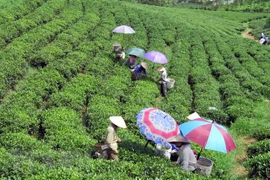Hanoi (VNS/VNA) - Prime Minister Nguyen Xuan Phuc requires ministries, sectors and localities to reform their institutions, simplify administrative procedures, cut costs and remove barriers to export.
This is part of the Prime Minister’s Directive No 25/CT-TTg dated on August 31 on a number of tasks and solutions for production development and export promotion.
The directive states that in the past years, export activities have seen strong growth, rising an average of 13.5 percent per annum over the past two years.
The trade surplus is maintained in both 2016 and 2017.
In particularly, exports in 2017 achieved high results in terms of scale and growth rate as it’s the first time Vietnam's export value exceeded 200 billion VND, an increase of 21.2 percent compared to 2016, which is seen as the highlight of the country’s economy. However, there are still many difficulties and challenges facing the country.
In order to bring into play the results achieved, overcoming shortcomings and promoting exports fast and in line with tasks and solutions of the 2011-20 Export-Import Strategy, Phuc wants ministries and sectors to promptly review a number of regulations on production and import of raw materials and auxiliary materials for production and processing to create favorable conditions for production activities of enterprises. At the same time, it’s needed to strengthen information work to orient the production for export.
The Ministry of Industry and Trade (MoIT) will direct the Vietnamese Trade Office system in overseas markets to enhance the initiative in capturing market information and arising problems affecting Vietnam's exports such as policy changes of importing countries, technical barriers, payment risks and unwanted propaganda activities for Vietnamese exports. All information will be sent to the Government, ministries, sectors, associations and enterprises to respond promptly.
Phuc pointed out the need to promote the restructuring of agricultural production in line with the market demand, improve the quality and meet the requirements of food safety.
“The ministries and sectors must focus on solutions to remove difficulties in order to boost the export of agricultural commodities such as seafood, vegetables, coffee, cashew, pepper, rice and cassava,” Phuc said in the directive.
The development of industrial production must be in association with specific conditions of each region and each locality as well as the development of scale and high technology. Meanwhile, it’s necessary to concentrate on solutions to remove difficulties for the export of valuable industrial goods such as of textile, footwear, electronics, wood and wood products.
The Prime Minister also asked ministries and sectors to enhance negotiation and integration to develop the market and remove barriers to enter new markets as well as strengthening the trade promotion and brand building.
“MoIT will be in charge of studying the comprehensive renewal of trade promotion activities such as skill training, but reducing activities such as organising fairs and exhibitions or participating in fairs and exhibitions. It’s needed to focus on medium- and long-term trade promotion programmes that target one commodity and one market until reaching concrete results,” stated the PM directive.
The ministry will also attach great importance to training and dissemination of rules of origin and how to meet the rules to help businesses capture the opportunities opened up from free trade agreements.
“It’s needed to promote branding for products and export enterprises through the national branding programme in the key and potential markets of Vietnam and focus on branding for key industries such as textiles, seafood and fruit.”
Phuc also asked industry associations to promote market information for their members in order to increase their activeness and prevent risks when the markets fluctuate, promoting information to members on modern management models, the importance of improving design and diversification of products, improving quality and creating branded products for export.
Associations should promote their role in linking businesses as well as being representatives to protect the legitimate rights and interests of businesses in international trade. They should perform well their role in the combination between the State management agencies and enterprises and assist the State in organising training and use of labourers after training.-VNS/VNA






























